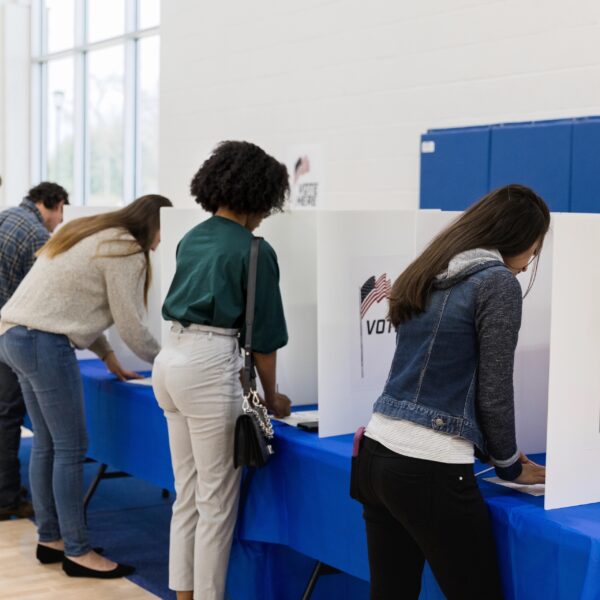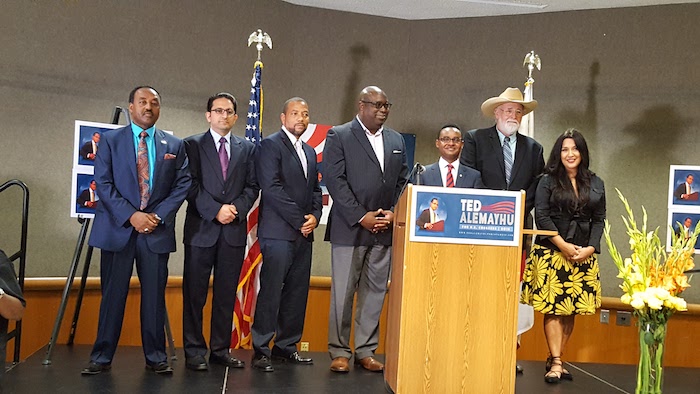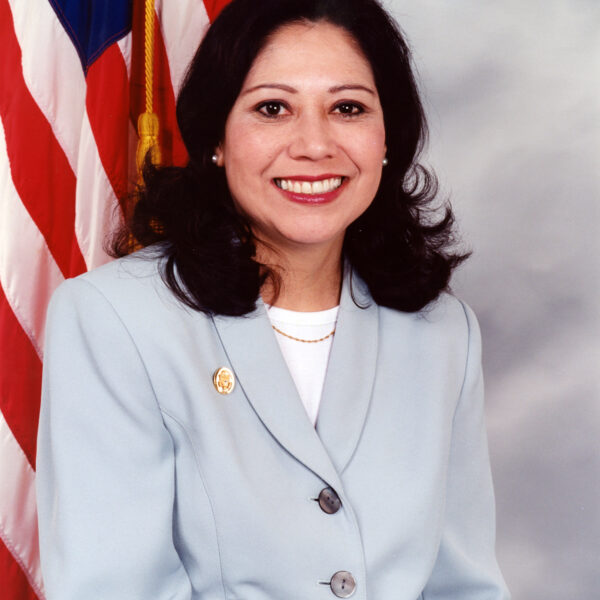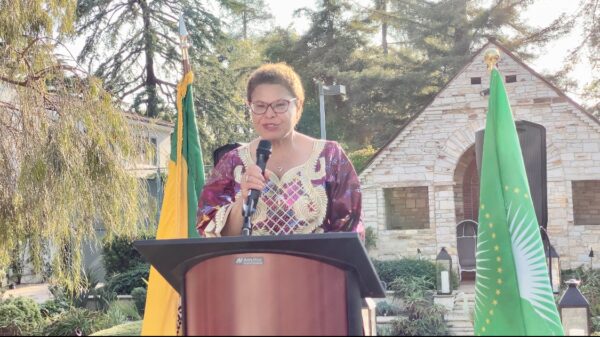During a briefing organized by Ethnic Media Services (EMS), caregivers, health experts, and prominent figures in Alzheimer’s advocacy came together to tackle a pressing issue: the pervasive stigma surrounding Alzheimer’s disease across diverse communities.
They explained that the stigma attached to Alzheimer’s often acts as a barrier to effective care and support for those affected. One prominent voice in the Asian American and Pacific Islander (AAPI) community likened the branding of Alzheimer’s to labeling someone as “crazy,” emphasizing the damaging impact of such perceptions.
The speakers in this briefing represented a diverse array of expertise and backgrounds, including medical researchers and grassroots activists. Their goal was to share insights into tackling cultural taboos surrounding Alzheimer’s and other forms of dementia within communities spanning Latino, Black, AAPI, and LGBT+ demographics.
Dr. Lucía Abascal from the California Department of Public Health (CDPH) led the discussion, providing an overview of Alzheimer’s disease and highlighting its alarming prevalence. Contrary to expectations, Dr. Abascal shared, Alzheimer’s is not just a leading cause of death in California; it’s projected to double in prevalence by 2040. Dr. Abascal also underscored the stark disparities in Alzheimer’s prevalence, particularly affecting women and communities of color.
She introduced the “Take on Us for American” campaign, a groundbreaking initiative by CDPH aimed at shifting public perceptions and reducing the stigma surrounding Alzheimer’s. The campaign recognizes the crucial role of community engagement in dispelling myths and fears associated with the disease. By fostering open dialogue and normalizing discussions about Alzheimer’s, the campaign seeks to encourage early diagnosis and proactive healthcare-seeking behavior.
Dr. Abascal emphasized the importance of early detection in Alzheimer’s management, as it allows for timely intervention and access to support services. The campaign aims to empower Californians to recognize the signs of Alzheimer’s, initiate conversations with loved ones, and adopt lifestyle measures to reduce risks.
Throughout the discussion, there was a strong emphasis on community involvement and collaboration. Dr. Abascal highlighted the existing efforts within communities to address Alzheimer’s impact, underscoring the need for coordinated partnerships and innovative approaches.
Personal connections to Alzheimer’s further underscored the urgency of collective action. Dr. Abascal shared her own experience with family members affected by the disease, resonating with many attendees who likely have similar stories. This personal touch reinforced the notion that Alzheimer’s is a shared challenge that demands a collective response.
Dr. Abascal concluded by calling for concerted efforts to destigmatize Alzheimer’s, promote early detection, and support affected individuals and their families. By harnessing community engagement and leveraging resources, Californians can confront Alzheimer’s with resilience and compassion, ultimately striving towards a future where the disease no longer carries the weight of taboo and fear.
Dr. Dolores Gallagher Thompson, a distinguished figure in the field of Alzheimer’s research with a focus on Asian American communities, addressed the stigma surrounding Alzheimer’s, particularly within the Chinese and Vietnamese communities. With over 30 years of experience working with diverse populations, Dr. Gallagher Thompson offered valuable insights into the unique challenges faced by caregivers within these communities.
She highlighted the immense stress experienced by Chinese and Vietnamese caregivers, often middle-aged daughters or daughters-in-law, who find themselves in the demanding role of caring for elderly family members while also managing the needs of their own children. This “sandwich generation” phenomenon creates a significant burden, leading to reported feelings of stress and depression among caregivers.
A crucial aspect of caregiving in these communities is the concept of filial piety, deeply rooted in traditional Chinese culture. While older generations may expect unwavering dedication to caregiving duties, younger caregivers may struggle to reconcile these expectations with the complexities of modern family dynamics. Dr. Gallagher Thompson underscored the importance of understanding these cultural nuances when designing intervention programs, emphasizing the need to treat families as holistic units rather than focusing solely on the individual with dementia.
One of the primary challenges in combating stigma within the Chinese community lies in the linguistic association between “crazy” and dementia. Dr. Gallagher Thompson explained how traditional Chinese characters equate the two terms, contributing to misunderstandings and heightened stigma surrounding dementia. By educating families about the neurological nature of dementia, she believes it’s possible to challenge these misconceptions and reduce associated shame and fear.
Effective interventions, Dr. Gallagher Thompson suggested, should equip caregivers with practical skills for managing challenging behaviors and improving communication with their loved ones with dementia. These interventions must be culturally sensitive and tailored to the specific needs of each community, integrating input from community advisory boards and ensuring cultural relevance in program materials.
Furthermore, Dr. Gallagher Thompson emphasized the importance of caregiver self-care, albeit framed in culturally acceptable terms. By reframing self-care as an essential skill for becoming better caregivers, interventions can promote caregiver well-being without challenging cultural norms directly.
In summary, Dr. Gallagher Thompson’s insights shed light on the intricate interplay between cultural beliefs, family dynamics, and caregiving experiences within Chinese and Vietnamese communities affected by Alzheimer’s. Her expertise underscores the necessity of culturally informed approaches in addressing stigma and supporting caregivers on the front lines of Alzheimer’s care.
Dr. María Aranda, a renowned expert with extensive experience in Alzheimer’s research and advocacy, offered profound insights into the pervasive stigma surrounding memory loss, especially within Latino communities. As a member of the governor’s task force and someone deeply immersed in the field, Dr. Aranda’s observations shed light on the complex interplay of societal norms, cultural beliefs, and individual experiences.
Stigma, Dr. Aranda asserted, is a formidable barrier that transcends cultural boundaries, affecting discussions around memory loss across diverse communities. Despite the prevalence of Alzheimer’s discussions, memory loss remains a taboo topic, often shrouded in shame and fear. Dr. Aranda underscored the societal pressure placed on intellect and competency, exacerbating the stigma associated with cognitive decline.
Within Latino communities, stigma manifests in various ways, including a reluctance to acknowledge memory loss as anything more than a normal part of aging. This denial impedes access to essential services and resources, contributing to a cycle of marginalization and isolation. Dr. Aranda emphasized the need to address these misconceptions and promote an accurate understanding of memory loss.
Moreover, Dr. Aranda highlighted the concept of overprotection within families, where individuals living with dementia are shielded from societal judgment at the expense of accessing necessary support and care. This cocooning effect, while well-intentioned, hinders opportunities for diagnosis, intervention, and participation in clinical trials.
Language barriers further compound the issue, particularly for monolingual Spanish speakers who face limited access to information and resources. Dr. Aranda stressed the importance of providing culturally and linguistically appropriate support to ensure equitable access to care and education.
In addressing stigma, Dr. Aranda emphasized the critical role of healthcare providers and policymakers in challenging biases and promoting inclusive practices. By fostering a supportive environment that prioritizes education, awareness, and community engagement, it’s possible to dismantle stigma and empower Latino individuals and families affected by memory loss.
Dr. Aranda’s insights underscore the multifaceted nature of stigma surrounding memory loss and the imperative of adopting comprehensive strategies to address it. Through collaborative efforts and a commitment to cultural competence, we can strive towards a society where memory loss is met with understanding, support, and dignity for all.
Luna Krisanta, an advocate for LGBTQ+ rights and an expert in Alzheimer’s and dementia care, brought attention to the unique challenges faced by LGBTQ+ elders, particularly regarding stigma and discrimination. Luna’s work focuses on providing tailored support and education to this community, recognizing their diverse backgrounds and needs.
LGBTQ+ elders, Luna explained, have endured a lifetime of societal discrimination, from the Lavender Scare of the 1950s to the pathologization of homosexuality as a mental disorder. Despite these challenges, they have shown resilience in the face of adversity, advocating for their rights and identity.
However, as LGBTQ+ individuals age and require more care, they often encounter further discrimination within healthcare settings. Many are reluctant to disclose their sexual orientation or gender identity to medical professionals, fearing judgment and inferior treatment. This reluctance can lead to delayed diagnosis and inadequate care, particularly concerning conditions like dementia.
Moreover, LGBTQ+ elders are disproportionately affected by economic insecurity, further complicating their access to quality care. Discrimination, abuse, and neglect are significant concerns, with a significant percentage reporting mistreatment from caregivers due to their sexual orientation or gender identity.
Luna emphasized the importance of creating inclusive support networks for LGBTQ+ elders, recognizing the unique family structures and intergenerational challenges they face. Organizations like Open House play a crucial role in providing housing, mental health support, and community programs tailored to their needs.
Despite the obstacles, Luna shared stories of resilience and empowerment within the LGBTQ+ elder community. Through support networks and advocacy efforts, individuals like the transgender woman and intersex person Luna mentioned can find acceptance and live authentically.
Luna concluded by stressing the significance of small acts of support in improving the lives of LGBTQ+ elders. By addressing stigma, discrimination, and systemic barriers, society can create a more inclusive and supportive environment for all aging individuals, ensuring they can live with dignity and authenticity.
Petra Niles, an advocate for Alzheimer’s awareness within the African-American community, shed light on the significance of addressing the stigma surrounding dementia, particularly Alzheimer’s disease. Petra’s remarks highlight the unique challenges faced by African Americans concerning healthcare disparities, cultural perceptions, and societal attitudes toward aging and cognitive decline.
Acknowledging the diversity within the black community, Petra emphasized the need for culturally sensitive research and education initiatives. She underscored the alarming statistics showing that African Americans are twice as likely to develop Alzheimer’s or other forms of dementia compared to older whites. This health disparity, coupled with higher prevalence rates of conditions like high blood pressure and diabetes, underscores the urgency of addressing Alzheimer’s within the black community.
Petra discussed the importance of early diagnosis and dispelled misconceptions about aging and cognitive decline. She stressed the need for individuals to recognize warning signs and seek medical attention promptly, urging healthcare professionals to provide compassionate and culturally competent care.
Moreover, Petra delved into the various forms of stigma surrounding Alzheimer’s, including self-stigma, social stigma, and structural stigma. She highlighted the negative impact of stigma on individuals living with the disease, their families, and their access to resources and support.
Throughout her remarks, Petra emphasized the necessity of destigmatizing Alzheimer’s within the African-American community. She called for greater awareness, education, and advocacy to address the misconceptions and barriers hindering early diagnosis and effective care.
In conclusion, Petra underscored the ongoing challenges posed by Alzheimer’s and the importance of framing discussions about the disease in a sensitive and empowering manner. By fostering open dialogue and providing culturally relevant support, communities can work toward improving outcomes and quality of life for those affected by Alzheimer’s within the African-American community.
#AlzheimersAwareness #StigmaFree #CommunitySupport #HealthAdvocacy #CaregiverResources #DiversePerspectives #BreakingBarriers #HealthEquity #EthnicMedia #PublicHealth











